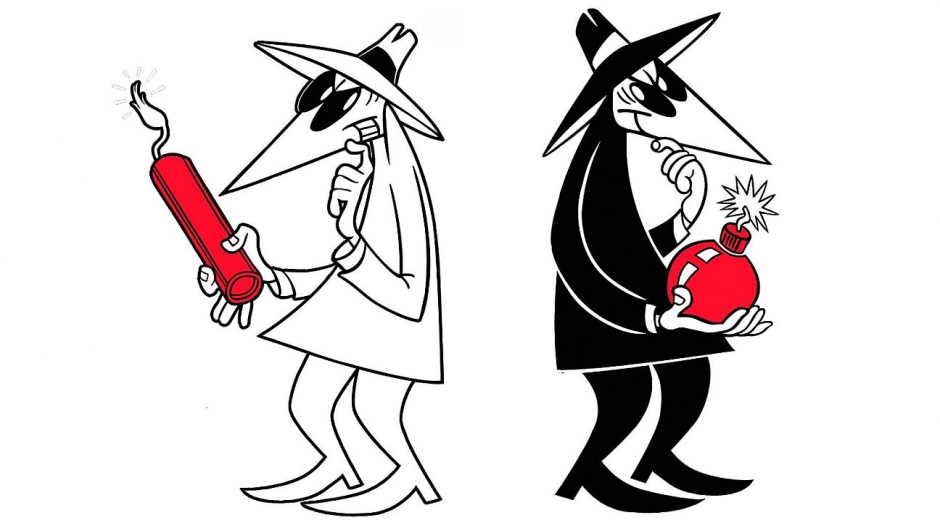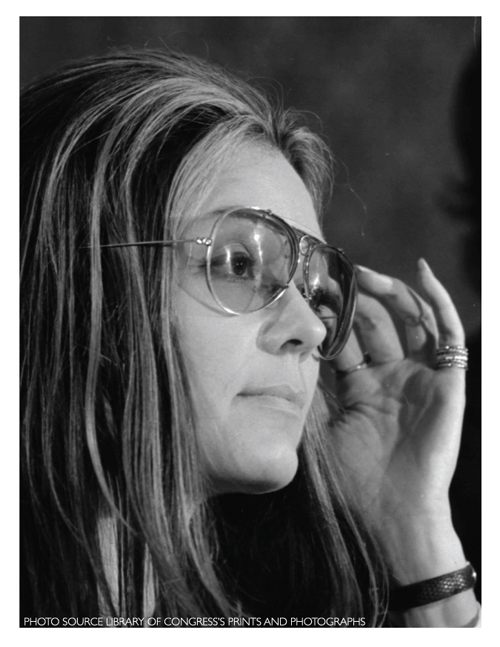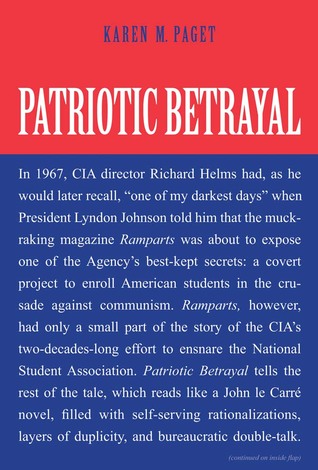
You Should Read: Paget

Thomas McAdam
iLocalNews Louisville is your best source of news and information about Derby City.
- Professional Journalist
With the publication of Karen M. Paget’s new book, Patriotic Betrayal, I am compelled to confess to iLocal News readers that I was, in fact, a spy for the Central Intelligence Agency, from 1961 to 1963. And, since I am famously known for my inability to keep secrets, I know I have some ‘splainin to do.
Ms. Paget, like me, a former officer in the U.S. National Student Association (USNSA), explains it best in her own words: “In 1967, CIA director Richard Helms has, as he would later recall, ‘one of my darkest days’ when President Lyndon Johnson told him that the muckraking magazine Ramparts was about to expose one of the Agency’s best-kept secrets: a covert project to enroll American students in the crusade against communism. Ramparts, however, had only a small part of the CIA’s two-decades-long effort to ensnare the National Student Association. Patriotic Betrayal tells the rest of the tale, which reads like a John le Carré novel, filled with self-serving rationalizations, layers of duplicity, and bureaucratic double-talk."
director Richard Helms has, as he would later recall, ‘one of my darkest days’ when President Lyndon Johnson told him that the muckraking magazine Ramparts was about to expose one of the Agency’s best-kept secrets: a covert project to enroll American students in the crusade against communism. Ramparts, however, had only a small part of the CIA’s two-decades-long effort to ensnare the National Student Association. Patriotic Betrayal tells the rest of the tale, which reads like a John le Carré novel, filled with self-serving rationalizations, layers of duplicity, and bureaucratic double-talk."
USNSA was an association of student governments, and I began my spooking career as campus representative at Bellarmine College (now, Bellarmine University). I soon became Regional Chairman for Kentucky and Tennessee, and served on USNSA’s National Executive Committee (NEC). It was my job to travel around giving talks to student government bodies, encouraging them to join the national union of students.
When I got word that the student government at Vanderbilt University was threatening to withdraw its membership in USNSA, I headed down to Nashville, and gave a passionate speech, defending the organization against charges that it was dominated by commies and civil-rights fiends. I couldn’t tell them that USNSA was really a front for the CIA, because, in point of fact, I had no idea who I was really working for.
After my wonderful speech, the Student Senate at Vandy voted almost unanimously to withdraw from USNSA, and then some of the student government officers took me out and bought me all the beer I could drink (which, at the time, was considerable). So, the trip to Nashville went down in my book as a mixed success, and I will always have a warm spot in my heart for the Commodores.
Another time, I got a call on a Saturday that some of the NEC officers wanted to talk to me, as soon as possible, in a room in the Park Sheraton Hotel, in New York. A ticket would be waiting for me at the airport. When I got there, a couple of my NEC friends where in the room, along with three “older guys,” who were wearing suits and ties. I was pretty sure they weren’t students, but it didn’t mean much to me at the time.
 It seemed they wanted to send me to Finland, to represent USNSA at the University of Helsinki. They suggested that I might want to make friends with some of the Russian students who would be there. The interview lasted almost two hours, and I expressed enthusiasm at the idea of representing American students in a foreign country.
It seemed they wanted to send me to Finland, to represent USNSA at the University of Helsinki. They suggested that I might want to make friends with some of the Russian students who would be there. The interview lasted almost two hours, and I expressed enthusiasm at the idea of representing American students in a foreign country.
A few days later, I received a call from the USNSA president, informing me that they had selected someone else for the project, but thanking me for my interest. It wasn’t until I read Karen Paget’s book that I learned they sent NEC member Gloria Steinem in my place. Yes, that Gloria Steinem. (All the guys on the NEC had a secret crush on Gloria.)
During the summer of 1963, we had an international student conference at Indiana University, and the NEC assigned me to be host for a group of student leaders from Nigeria and Kenya. I drove them around, and saw to it that they had a good time. I knew all the bars in Bloomington where “undocumented” (under-21) students could get a cold beer.
After the conference, I stayed around for some NEC meetings. I remember one, where the USNSA President, Vice-President for International Affairs, and I, sat around drinking beers with a couple of the “older guys” to discuss our African guests. The suits were taking notes, but, since they were buying the drinks, it didn’t occur to me to say anything. The suits wanted to know what the Nigerian and Kenyan student government leaders had to say about Lumumba, Nkruma, and, of course, President Kenne dy.
dy.
Although it didn’t dawn on me at the time, the “suits” were CIA agents, who were developing dossiers on our African guests. Years later, these students would probably be prime ministers and political leaders in their countries, and it would doubtless be helpful for America to have some background information on them. I had been “debriefed” and didn’t even know it.
It now appears that USNSA was a creature of the CIA, which financed the whole operation. The officers of the organization were elected each year by student representatives of American colleges and universities, but only one or two officers each year were told that USNSA was a CIA front. With subtle coercion, they were “encouraged” to sign the Official Secrets Act, and their silence was pretty much guaranteed by the threat of a life term in Leavenworth.
Even though I was a national officer of USNSA, I was only an “unwitting” agent for the CIA. I was totally clueless. Karen M. Paget was a “witting” operative, and has now had the courage to spill the beans.
You can pick up a copy of Patriotic Betrayal at Amazon for about 24 bucks.
“You Should Read” is a weekly iLocal News series, reviewing not only the latest books by local writers, but also reminding readers that some of the best books in print have been around for a long time. As Mark Twain said, “The man who does not read has no advantage over the man who cannot read.”
Books are wonderful things. Whether you are lying on the beach, or curled up in your favorite chair in front of a fire on a frosty day, a good book to read will fill your day with enjoyment. It doesn’t matter if your book is a leather-bound treasure, an inexpensive paperback, an electronic Ebook or Kindle, or an audiobook playing on your car radio. Books excite, inform, move the soul, and stimulate the senses. Reading expands your world, and makes you a more interesting person.
As Groucho Marx once said, “Outside of a dog, a book is a man's best friend. Inside of a dog it's too dark to read.”